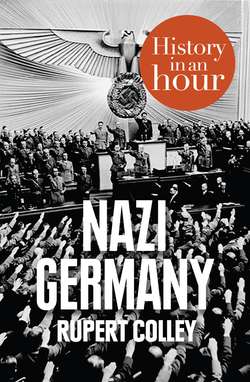Читать книгу Nazi Germany: History in an Hour - Rupert Colley - Страница 6
ОглавлениеThe German Revolution: The End of the Second Reich
In October 1918, sailors at the port of Kiel disobeyed orders to fight the British fleet. It was, as they saw it, a pointless and suicidal mission. The revolt soon spread throughout Germany. The province of Bavaria went so far as to establish a socialist republic along Soviet lines. The Kaiser, William II, the unhinged grandson of Queen Victoria, abdicated on 9 November 1918, two days before the armistice, and the chancellor, Prince Max of Baden, appointed a left-wing coalition government and handed over the chancellorship to Friedrich Ebert.
With the abdication of the Kaiser and the collapse of Imperial Germany (the Second Reich – or empire), Ebert proclaimed Germany a republic, formed a provisional government (a temporary arrangement until elections could be held) and, on 11 November 1918, signed the armistice that brought the Great War to an end.
But the social unrest continued. In January 1919 the German Communist Party, the Spartacists, staged an uprising in Berlin. Rosa Luxemburg, leader of the movement, had opposed the uprising, arguing that the time was not yet right for communism. But she was unable to contain the fury of the left and Chancellor Ebert turned to the right-wing Freikorps, or Free Corps, for assistance. After three days of intense street fighting the Freikorps, a band of demobilized, nationalistic soldiers, had, with intense violence, crushed the rebellion. Luxemburg was arrested and killed while in police custody.
The Weimar Republic: A Republic Is Born
The first German democratic election took place the same month, January 1919, attracting an 83 per cent turnout and resulting in the formation of a National Constituent Assembly. The situation in Berlin was still volatile so on 6 February the Assembly met for the first time in the town of Weimar and there drew up a new constitution. Six months later the constitution was ratified and the Weimar Republic was born. However, disturbances continued, especially in Berlin and Bavaria, and Ebert again had to call in the Freikorps to keep order. In March 1919 the Freikorps went to work and the Socialist Republic in Bavaria was brought to a bloody end.
